#about jamaican history
Text
can African Americans please stop saying "black culture" in reference to the homogenised African black cultures in the United States please
#its extremely reductive even in America#there are so many black people internationally in different nations with different cultures#im Nigerian i have no idea what cultures are in Uganda#im Yoruba i have no idea what cultures go on in Igbo#im black British so i understand other like Ghanian and Jamaican cultures#im black British and i have so much knowledge about African American culture because it is exported to me and then posed as “my culture” as#a black person. That cant be right#black brit#black people#black culture#aave#i have so many takes on aave ans how other people should be able to use it as a black brit who knows white boys eho say wagwan. it's not as#big of an issue as most people think tbh#African#african american#black history#black cultures#please dont homogenise blackness.
17 notes
·
View notes
Text
Emancipation came to Jamaica and Barbados in the 1830s after it was won by fire and sword:
Emancipation, far from being 'on offer' and 'intended' in the 1770s only came in the 1830s, in the wake of the serial rebellions in Jamaica that led the British to view slavery as more expensive than could be justified. If it seems like I belabor the point, this is unfortunately the kind of reality papered over by a major case of historical bullshit spread in the United States, hence the double emphasis on noting the actual sequence of events and how and why things happened the way they did.
#lightdancer comments on history#black history month#jamaican history#british empire#emancipation of slavery in the british empire#no the British Empire was not about to abolish slavery in the 1770s regardless of what historical falsifiers in the USA tell you#that emancipation was seized in a bloody and merciless fashion
8 notes
·
View notes
Text
the annoying thing about ska fans is that they're so optimistic that they'll completely forget about everything that happened in the ska scene before they were alive. its getting better with the 4th wave nowadays but damn...the 90s kids ONLY remember the 90s...
#i literally have to look so hard for history about this genre#why is it so hard it literally involves en mass cultural diffusion from reasons that -- once i found out --#ARE VERY EASY TO TRACE BACK TO SHIT THAT MAKES SENSE#why is ska happy? its music of celebration#what is it celebrating? jamaican freedom from the british#why did jamaican people immigrate to britain? because britain had an extreme loss of employed people#why did they have an extreme loss of employed people? ww2#why are all the ska bands singing about not having a job then? job market decreased#why did the job market decrease? bloody thatcher#and then the rudeboys had a reason for their genre to be punk-infused#because they were angry about the political atmosphere of the time#plus the only pay they could get was from fighting skinheads#which is ANOTHER thing modern-day moonstompers COMPLETELY dismiss dont even get me started#worst part is its extreeemely in character for ska fans#lmao#anyway ive been studying the history of ska in my freetime#can you tell#ska#2nd wave ska#rambling in the tags#music history#history
4 notes
·
View notes
Text

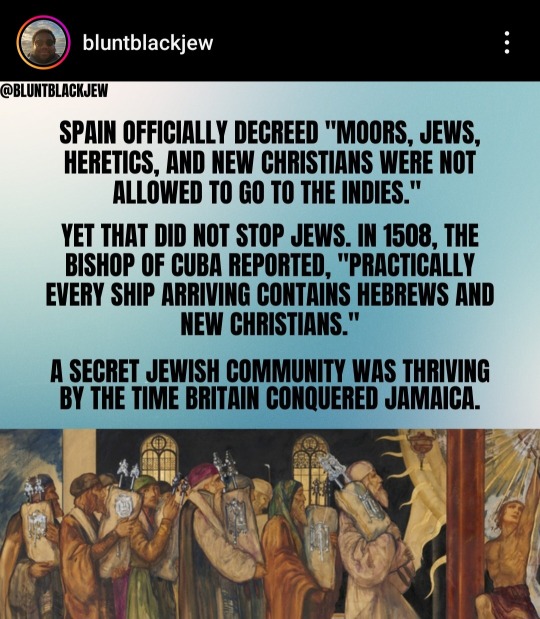


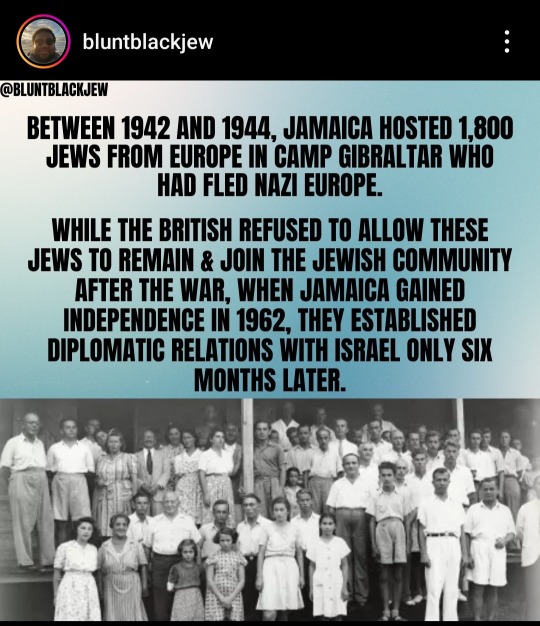
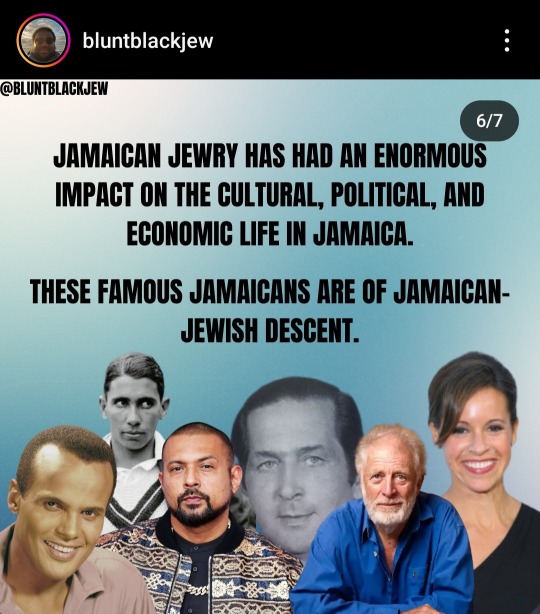
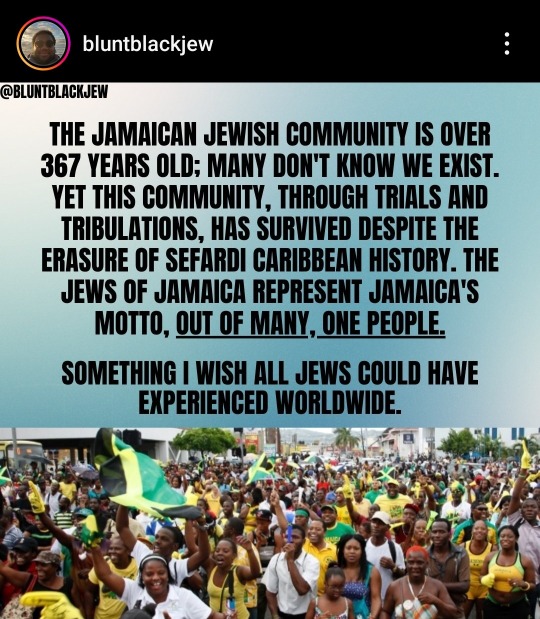
Bluntblackjew via Instagram: "Jamaican Jewish history is so extensive that this post would, instead of 7 slides, probably extend to 30 or more. That is what I love about the history of Jamaica, and the fact this is history is living history. This condensed version is how Jamaican Jews came as refugees and became one of the many people on the island to directly influence history
"Jews in the Caribbean, especially Safardi Jews, never disappeared. We continue to exist, and I hope this post educates and removes the erasure of our history that we continue to see."
#bluntblackjew#Jamaican Jews#jamaica#black jews#jews#judaism#jamaicanhistory#Jamaican History#caribbean#Jewish History
505 notes
·
View notes
Text
super short london slang guide !!
i haven't got a scooby doo about cockney so this is mainly gonna be mle and like the way 14 year old secondary school boys talk oookay let's go (just so yk i am a londonder!!!!!)
direct things to call people (or avoid calling people)
bruv, blud, man, mate, fam (can use in replacement of a pronoun like he, she, you and i or for emphasis — "man's got a meeting, bruv!")
more on "man" it can be used in plural too — "us man" or "them man" or "you man"
my g, my guy (for referring someone you are friendly/friends with)
bossman (something you'd call a shop or business owner — "aye bossman get me the 3 wings and chips yeah")
big man (usually used in a sarcastic friendly but kind of demeaning way, the older cousin of "big guy" — "oi big man what you sayin' cuz?"
i wasnt going to put these here cause of personal preference but 😭 people are gonna use them anyway so i might as well tell you what they mean:
peng (adjective cute/pretty — "her? she's peng!")
leng (adjective hot/sexy — "rah, he's leng you know?)
nouns
ting (usually to refer to a girlfriend but can also just mean "thing"... or a knife? — "don't chat to my ting fam!")
grim (very outdated word for a promiscuous woman — "she's a grim bruv!")
skeng (gun)
shank, spinner (knife)
paper, Ps, pronounced "peas" (money)
ends (neighbourhood, area — "if i catch you in my ends yeah")
mandem (group of friends — "having a laugh at the pub with the mandem" aha)
gyaldem (group of women / female friends)
ganja (weed)
blem (cigarette)
pagan/paigon (snitch or untrustworthy person, not a super common you might wanna use "snake" or "snitch" instead)
wasteman (someone who's useless, a lowlife)
pussio/pussyo (pussy, coward)
other common words and phrases
wagwan, or "wag1" in text (what's up, what's going on)
bare (a lot — "i got bare problems with him!")
gassed (prideful, full of yourself — "im actually so gassed, man got promoted"
"and that" (instead of "and stuff" — "i got links and that")
"allow it" (let something slide — "i forgot my wallet allow it bossman")
safe (like "alright cool", or as a bye — "aight safe")
"pattern up" (fix up, get it together)
hard, tight (cool, good, though "hard" is also used in an offensive way — "bro thinks he's hard, pussio")
blam (to get shot, not actually very common to hear in my experience)
sheffed (up), shanked (to get stabbed)
ahlie (used as an interjection when in agreement with something, similar to phrase "am i lying?")
non-mle specific words i hear sometimes
thick (dumb, stupid)
clapped/tapped (ugly, weird, unattractive)
merk/murk (kill, beat up)
slag, sket (slut)
chav (used to refer to someone of the low social status, associated with violent or rude behaviour)
taking the mick, taking the piss (being annoying)
mad (means crazy obviously but people use it a lot, can have positive and negative connotations — "that's mad!")
nonce (literally means pedophile / sex offender, do what you will with it 😭)
dickhead, bellend (similar to douchebag)
wanker (used towards someone you dislike, or in a joking way)
geezer (usually to refer to an old man)
also!!!
depending on which communities are predominant in the area, words from other languages can come in / have come in
some words are common with US slang too because they share origins 😁 ain't that cool
there's a lot of influence from jamaican patois due to the history of british jamaicans in london for ex in words like "ting" or "mandem" or "wagwan" (hence why mle is sometimes referred to as "jafrican") and its not strange to hear "bomboclaat" or "bloodclaat" here either
in communities where there's muslims and arabs (especially in east london) you might hear arabic terms like "wallahi", "khalas" or "astagfirullah" (though people debate whether that's cultural appropriation or not)
south asians have also had an influence with words like "gora" or "ganja" though again this is largely area based and the impact of hinglish is also found a lot outside of london
some people have a mix of different dialects! i mainly alternate between mle and estuary (sometimes yorkshire don't ask it is very easy to pick up...)
you're not gonna hear every single word here all the time the usage varies throughout london. the way north and west londoners speak can be v different for example
uhhhh if you wanna learn properly just listen to some grime or sutn . listen to londoners speak!
for some more resources in-depth PLEASE check out these guides made by other british people ! (one and two)
ok that's it bye bye british ppl & londoners feel free to add on! it is midnight rn so ive probably missed stuff lol... dms are open in case you've got any questions or want any help :p
#vee rants#hobie brown x reader#spider punk#spider uk#hobart brown#hobie brown#hobie brown x gn!reader#british accent#london accent#potential to be edited
583 notes
·
View notes
Text
Iridiscent
PirateAU! Miguel x Mermaid! Reader
Thanks to @sarapaprikas-blog for the idea ❤️✨. Been loving to experience with different AU'S lately ✨. Hope you like!

Warnings: Mild angst and historical figure mentions, implied mysticism ~
Prologue ✨
Pt. 2
As far as history was told, the sea had been the biggest grave in the world. Countless men, nations and civilizations perished under the might of the ever infinite sea. Not many dared to venture, after all, the stories of countless ships sunk under behemoth waves reached through all dry land known.
But that didn't stop the greatest empires to expand and colonize newly discovered lands thanks to years of observation. Many thought of the sea a living being, a being that could be tamed or at least controlled enough to small civilizations to be born in lands people only dreamed of.
However, as the sea earned it's title of a living creature, the mysticism around it grew. Many believed the sea was a she, and bringing a woman on board only made her jealous. A common belief among outcasts and pirates. Something that was debunked as the golden age of piracy advanced.
But even so, the word spread around was that the sea favored female pirates better than men. Lagertha, Mary Read, Anne Bonnie, Zheng Shi, Grace O'Malley, to name a few of the most iconic pirates that against all, conquered, navigated, commanded and plundered at their contempt.
Many believed that they had done a pact with the devil himself, but others strongly believed that there were creatures below that left no trace once the women settled for a target. Mermaids.
Creatures often described as the beauty of death itself embodied. Beautiful women luring men to their inevitable deaths. Something, that some men longed for, and feared by others. The rumor was that if you caught a mermaid alive, the creature was bound to grant you a wish.
But for Miguel, they were nothing but myths and lies. A once young and naive self had ventured in the sea to find one, so he could cure his daughter once the land medics had abandoned all hope. And so he did, once his little girl had closed her twinkling innocent eyes, full of dreams, forever.
He was a changed man after that. He didn't allow his men to talk about such nonsensical things in his ship, Reina Gabriela, and poor of the man that was caught red handed. Reason had gotten him where he was, a feared outlaw among the Spaniards and English folk alike. Not by his overall intimidating looks, but the ruthless and cunning of his attacks.
The Red Eyed Demon, they called him.
------
Miguel had settled the route towards an island that promised a proper restock of his resources. He would let his men unwind, he'd probably spend the night away with a well prepared courtesan. The type of woman that knew how to entertain him beyond the physical ways, once they were on land.
By sunset, he would be landing. The island itself wasn't a problem, the inhabitants of it were. At least for him, full of highly superstitious people, that were always showering him in foul smelling concoctions, lung itching fumes and heavy charms of protection to "cleanse the spirit of anything that could drag you and your ship down".
Isla del Sol, or Sunny Island as many called it, was like a secret hideway-paradise for Pirates that stopped by to rest. Opposite from what the Spaniards and English believed, the Island was run under the command of a council of five.
A retired English commander that did better as a pirate than a law enforcer named Edward, A Spaniard pirate well versed in the arts of administration named Xavier, A jamaican man which eloquence only rivaled the Queen's erudites themselves named Toussaint, An asian woman trained in the arts of killing and weaponry named Sheng Hyun, and a white haired chaman whose wisdom was often seeked by the rest.
So far the island had worked and thrived under their command. They had even asked Miguel to join them, because of his strategic and cunning mind. But of course, he refused. A man like him wasn't easily bound to bureaucratics, even though, ironically he had strict rules in his ship.
His men were loyal, after all, Miguel took proper care of his crew. Well fed, healthy, well armed, and now, well rested. Reina Gabriela approached the docks and soon the men worked. Some put the extended sails away, others put the weaponry in their place, others cleaned and so on. Everyone had a role aboard, and Miguel made sure for them to accomplish it.
He threw a small pouch of gold to a nearby man to watch over his ship as he was out. The island felt like another city, but difference was, that inside land there were no guards, no laws that didn't benefit them. And if anyone caused a ruckus, Sheng Hyun was sent to deal with it, personally.
His men scattered around, except for the quarter master, the cook, weaponry master, Navy Engineer and doctor. They discussed briefly the upgrades for the ship, new dishes to the menu, and new places to get weapons, medicines and sturdier woods from. He dismissed them once everyone had their list, then he was alone.
His feet took him nearby the merchants as they exposed their goods to everyone passing by. Guards uniforms, royal weapons and wax seals perfect for an unsuspecting ruse, medicines, a new type of powder that was a bit more waterproof, Chinese explosives, sedating darts, portraits of naked royal women, some gemstones, and of course, luck charms and talismans.
He scoffed as his eyes rolled at the various trinkets. He had to admit that whoever came with these ideas had found a gold mine that relied in people's blind faith, probably would shake their hand if he ever knew who it was. One trinket stood out from the rest.
It was an iridescent pearl, a quarter size of his palm, along some black and pearly scales protuding ontop. There was no chain around it to be worn, the merchant noticed him staring at the trinket and smiled.
"Good if y'wanna catch a mermaid. They love shiny things."
Miguel looked at him with an eyebrow quirked and a skeptical look.
"You seem confident enough to sell these... crafts."
"Ah, another nonbeliever. Tis'fine mate. I've dealt with so many like you before. Mostly of the non believing part roots from something denied to you in the past. Am'i'rite?"
Miguel's jaw clenched softly at the boldness of the man. He looked like the typical merchant with shady business on the side.
"Leave this man alone, Joseph." The chaman of the council spoke behind Miguel as she took the pearl in her old, wrinkled hands.
"Come" He motioned Miguel to follow. Despite being a highly spiritual woman, the council's chaman did not pressure him into believing, but rather spoke to him sometimes in riddles. Riddles that he grew tired of eventually. He followed.
"A surprise to find you watching these sort of trinkets, Miguel."
"Hard to not when they get stranger and colorful each time I come here."
The elder lady hooked her arm on his as she supported on Miguel, that secured her as he walked next to her.
"I'd be grateful if you wouldn't speak about anything mystic tonight."
"Wasn't my intention, boy. But I must say, you've got quite the eye for these things. It's a real pearl, if you wish to sell it."
Miguel kept walking, being led by the chaman.
"Or I could gift it to a mermaid" Miguel chuckled and the lady looked at him with curious eyes.
"Well, to do such thing, you'd have to find one first."
"I won't, cause they're not real."
The chaman smiled smugly at him.
"What would you do if your homeland got infested with rotting bodies, blood and so many other unpleasant things continuously?"
"I'd look for a new home." he humored, but the lady only nodded in approval.
"And what kind of home you'd look for?"
"One that wasn't near the cities or civilization. Probably a secret manantial or even a virgin island"
The lady smiled
"Congratulations, Miguel. You now have the first lead into finding a mermaid."
"You can't expect me to believe such things."
"No lo espero, pero sé que tu curiosidad por dichas criaturas ha aumentado. ¿Qué es lo deseas tener?" (I don't, but I know for sure that your curiosity for such creatures have peaked your interest. What is it you long for?)
Miguel looked down at the lady, wistfully and she rubbed his arm comfortingly. Like a grandma would.
"My dear. Mystical creatures can only do so much, Miguel. Sadly, bringing back the dead isn't something they can do."
"No sabes de lo que hablas. No me conoces" (You don't know what you are talking about. You don't know me)
He seethed the last words as his grip abandoned the lady. His body tensed when the chaman reached out again to take his large hand.
"Loss is part of our lives, Miguel" Her wrinkled hands put the pearl in his hand, hers covered his warmly, pushing the trinket further in his hands, "And we all move on eventually. Life is full of wonders, and who knows, maybe what you find ahead in your path is exactly what you need"
He nearly growled as another riddle was added to the list.
"Te dije que te dejaras de-" (Thought I told you to quit the-)
His mouth gaped slightly, the lady was gone. He was left alone with the pearl in his hand, "Acertijos..." (Riddles...) he sighed and stared at the pearl, to then tuck it back on his pocket.
What was he longed for?
#miguel o'hara#miguel o'hara x you#miguel o'hara x reader#atsv miguel#pirate au#mermaid au#spiderman 2099 x reader#spiderman 2099#female rader
801 notes
·
View notes
Text
An innovation that propelled Britain to become the world’s leading iron exporter during the Industrial Revolution was appropriated from an 18th-century Jamaican foundry, historical records suggest.
The Cort process, which allowed wrought iron to be mass-produced from scrap iron for the first time, has long been attributed to the British financier turned ironmaster Henry Cort. It helped launch Britain as an economic superpower and transformed the face of the country with “iron palaces”, including Crystal Palace, Kew Gardens’ Temperate House and the arches at St Pancras train station.
Now, an analysis of correspondence, shipping records and contemporary newspaper reports reveals the innovation was first developed by 76 black Jamaican metallurgists at an ironworks near Morant Bay, Jamaica. Many of these metalworkers were enslaved people trafficked from west and central Africa, which had thriving iron-working industries at the time.
Dr Jenny Bulstrode, a lecturer in history of science and technology at University College London (UCL) and author of the paper, said: “This innovation kicks off Britain as a major iron producer and … was one of the most important innovations in the making of the modern world.”
The technique was patented by Cort in the 1780s and he is widely credited as the inventor, with the Times lauding him as “father of the iron trade” after his death. The latest research presents a different narrative, suggesting Cort shipped his machinery – and the fully fledged innovation – to Portsmouth from a Jamaican foundry that was forcibly shut down.
[...]
The paper, published in the journal History and Technology, traces how Cort learned of the Jamaican ironworks from a visiting cousin, a West Indies ship’s master who regularly transported “prizes” – vessels, cargo and equipment seized through military action – from Jamaica to England. Just months later, the British government placed Jamaica under military law and ordered the ironworks to be destroyed, claiming it could be used by rebels to convert scrap metal into weapons to overthrow colonial rule.
“The story here is Britain closing down, through military force, competition,” said Bulstrode.
The machinery was acquired by Cort and shipped to Portsmouth, where he patented the innovation. Five years later, Cort was discovered to have embezzled vast sums from navy wages and the patents were confiscated and made public, allowing widespread adoption in British ironworks.
Bulstrode hopes to challenge existing narratives of innovation. “If you ask people about the model of an innovator, they think of Elon Musk or some old white guy in a lab coat,” she said. “They don’t think of black people, enslaved, in Jamaica in the 18th century.”
848 notes
·
View notes
Text
Music Genres
When I was kid, you would have probably heard me say something like “I don’t believe in genre labels”. To a degree, there is still something about that sentiment that I agree with; I don’t think you can really put music and styles of music in neat little boxes. But otherwise, I was pretty much wrong about everything else.
Let’s go over that.
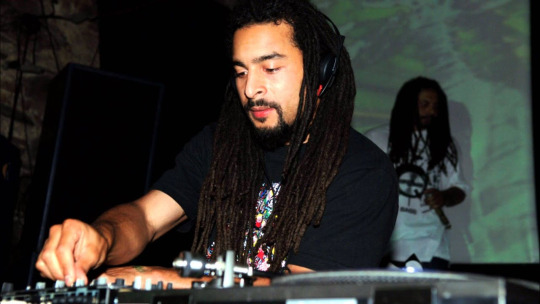
pictured: Mala, one of the godfathers of roots Dubstep
—
To be blunt, “genre” isn’t just about approximating what a song sounds like. If you say “I love pop music”, that honestly doesn’t mean much. The more specific you get, the more you will approach something someone can imagine like “I like experimental progressive noise pop music”. Ok, I can start to imagine things that likely approach what you're talking about, but even then it will usually not help someone fully understand what something truly is. In categorizing and approximating music styles, genres only go so far. So what makes them important then?
Well, not to say that approximating a style when describing an artist to someone is a bad thing or that doing so isn’t meant to be valued, but it’s hardly the only reason these labels exist. Importantly, “genre” helps establish culture, history, and a musical identity. So when you're trying to tell someone you're listening to a "progressive rock” project, you’re not just imagining odd time-signatures and complex riffs, you’re also meant to understand and consider that whatever is being described as to you has some sort of relevance or importance with regards to the history behind progressive rock; the culture of college bands in the UK, the sound that the punk movement revolted against, the progression of musical storytelling in rock music since the late 60’s and early 70’s, stuff like that. There’s a distinct culture and history you can pinpoint and understand when you describe something as being progressive rock and you can’t just go around calling any complex electric guitar oriented music "progressive rock" unless it has those specific ties as well as understanding and iteration of the roots.
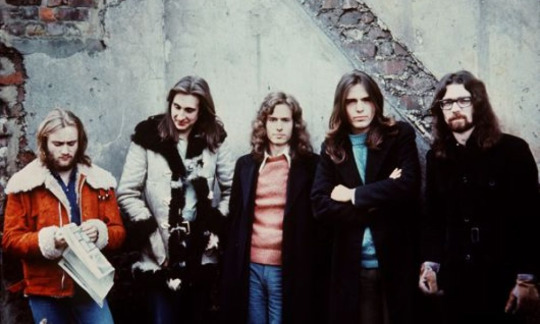
pictured: Genesis, because progressive rock mention
—
Genre labels help to clarify what kind of culture and histories a music project is being associated itself with and where a lot of its inspiration comes from. This is much more compelling reason for underlining the importance of genre labels and why they should be used correctly.
So, there is something I need to get off my chest then. There are a lot of misuses of genre labels all over the place, especially online. And I’m not talking about saying something is “Alternative Rock” when it’s clearly some kind of “Folk Rock” record instead. What I’m talking about is something like “Dubstep”.
Even as recent as a few years ago, I started personally reclaiming the term “Dubstep” as a genre label to describe any bass-adjacent music. At the time I did this, I thought it was cool, because the term Dubstep had been dubbed (pun intended) to be cringeworthy lexicon to some people. And while I feel that’s a noble reason to reclaim something like that, because some weirdos think it's cringe, in this case I actually think it’s wrong.
The term “Brostep” has been used to describe any non-roots bass-oriented music that originates from the proper roots Dubstep. It’s a term I didn’t like FOREVER, especially because the phrase was derived as a generalization of the kind of people who tend to listen to it. However, I actually think that Brostep is a title that people should be more comfortable and confident with labeling things as.
The original Dubstep came as a result of Jamaican immigrants bringing Dub music to the UK, which then fused with the remnants of 2-Step Garage which was prominent in the 90’s just years prior. Timbah.On.Toast made a great video called All My Homies Hate Skrillex and it is a really good breakdown of what separates roots Dubstep from the Americanized Brostep, which came after it. I think everyone knows by now that I have a deep, deep love for EDM based Broste and I am the biggest Skrillex fangirl alive. So being both a Brostep and Skrillex superfan, please understand that I think the video is one of the most important things you can watch as an EDM enjoyer.
Conflating the term Dubstep with things that aren’t actually Dubstep is honestly a slap in the face to all of the pioneers of Dub and Dubstep, which famously were both pretty much ENTIRELY invented by black people. I think it’s fair to say that incorrectly labeling music in this way has racist implications. It dishonours and twists the legacy of the music. You can find og Dubstep to listen to on the RYM Ultimate Box Set > Dubstep page. Check some of that out, then listen to some 2010, 2011 Skrillex and see how different things really went.
It confused me at first when I was a teenager, I didn't understand why so many people hated Skrillex back in the day. I came to realize so much of the hate wasn’t even really with regards music itself, but the total lack of understanding or care for the roots of the genre, which all of his work was founded upon and he then subsequently bastardized without caring at all. It was pure disrespect, it was practically cultural erasure and so many people will now only know of Dubstep as “that Skrillex transformer screech music”. Yeah. It actually fucking sucks.
But there is a LONG history of black music being erased from history and being undermined, whether entirely intentional or due to systemic unawareness.
I saw a post the other day talking about how it sucks that so much music is just lumped into being “video game music” when so much of this stuff has deep roots and cultural significance. The first example pointed how a lot of acid jazz music is just described as “Persona music” by the layperson now. Meanwhile, Acid Jazz as a genre is a huge development on things like roots jazz, disco, funk, and hip hop music. You know. All genres that were invented by black people. Fascinating, right?
Jungle music was also mentioned. And this one is very particular for me. Jungle music, when not being generalized as "PS1 Music", is often just called drum & bass or breakcore (also please Google the difference between breakbeat and breakcore, thanks) which are all fundamentally misunderstanding what Jungle music even is. Much of Jungle music, AS MANY THINGS DO, finds VERY prominent roots in Reggae, Dub, and sound system culture in Jamaica as well as countless other prominently black communities in the UK.
But it doesn’t stop there.
If you’re unfamiliar, there is a genre called “IDM”, otherwise known as Intelligent Dance Music. When I was a kid, and I first heard that word, I immediately was like “that is the most pretentious, stupid thing I’ve ever heard”. Eventually as I grew up, I just stopped thinking about that and started referring to more music as IDM. This style of music is generally characterized with “complexity” and being “not much danceable”. While I don’t think there’s anything wrong with the music that is called IDM, I do think there’s everything wrong with the term IDM, intelligent dance music.
When asked how he feels about being labeled as an IDM artist, Aphex Twin responded:
"I just think it's really funny to have terms like that. It's [basically] saying 'this is intelligent and everything else is STUPID.' It's really nasty to everyone else's music."
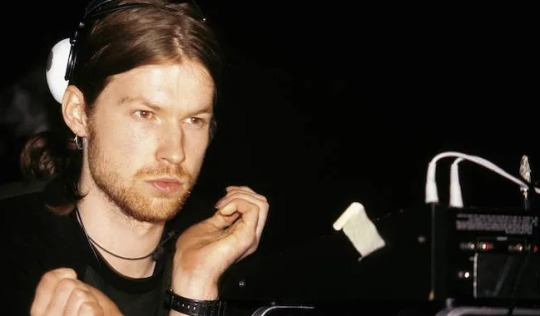
pictured: Aphex Twin, the funnyman himself
—
I think most people would agree with this sentiment. It’s so strange to call one kind of music “intelligent”, out of the hundreds of thousands of genres out there. But let’s bring this back to Jungle music. The reality is that IDM started to become a term around the same time that Jungle music became prominent, in the 90's. Both styles of music are complex, introspective, skittery, and chaotic (but refined and often disciplined) genres. Except, of these two, Jungle music was the one pioneered primarily by black artists. IDM was a sort in competition with Jungle. To therefore call IDM “intelligent” in comparison to Jungle music ... well. I don’t feel like I really have to explain why that’s fucked up.
A lot of people have proposed different names for IDM. A quick look on reddit yields things like “Experimental Electronic” and “Brain Dance” (which was coined by Aphex Twin's label). Me personally, the term “Electro-Prog” comes to mind. Sounds cool.
Similar conversations are presently being had about the term “Riddim”. This brings us back to the dubstep side of this discussion again. Riddim, as an EDM genre, is an offshoot of Brostep music that focuses a lot on repetition over the downbeat, maintaining an insanely distorted sound design, a lot more than the average Brostep song. However, the term “riddim” originates — yet again — from the Jamaican Patois for “rhythm”. And Riddim as a musical style in Jamaica is actually more associated with things like dancehall and reggae, rather than the commercialized "Riddim" that is several hundred times removed from its own roots.
Last year, musician INFEKT proposed that what most EDM listeners call “riddim” should be referred to instead as “Trench” in an article on their website. This proposed name is derived from Getter’s use of the term on his 2014 record “Trenchlords Vol. 1”. I don’t personally know how much I resonate with the term, but whatever the consensus is, I don’t think we should be conflating a westernized, commercialized, and EDM-centric genre like this to Jamaican roots music. Over and over again, it seems that black music is constantly overwritten by developments like this, so I think more care needs to be taken in not allowing that to happen.
As a side note, a lot of people online seem very keen on appropriating Jamaican Patois quite often? There are so many examples of this. When the term “Bomboclaat” started making the rounds on Twitter a few years ago, so many white people were quick to either talk wildly about the term and trend or otherwise start saying it as well. There was a fucking article that sought to answer “The Bomboclaat >> Meme << Meaning Explained”, like they’re not dissecting an element of Jamaican slang lol. Then there was a period of time where people were constantly saying things like “On Jah?” as a stand-in for “On God?” even though this, again, is Jamaican Patois. And even now, you have tons and tons of non-black people going everywhere being like “what is blud waffling about?”, the phrase “blud” ONCE AGAIN also being Jamaican in origin.
I shouldn’t even have to explain what makes these kinds of appropriations weird and messed up. But black people lose jobs and are denied basic things in life over their hair styles, their expressions and slang, and so many other things that a white person can just appropriate and face zero consequences whatsoever for.
That aside, aside. Understanding and labeling genres correctly is such a big part of music history and highlighting and preserving cultures worldwide. When efforts are made to undermine the meaning of a genre label or otherwise use it incorrectly, so much damage is done to the communities and people groups that innovate and pioneer this art to begin with.
For these reasons, I will gladly use the term Brostep. I will happily call things Electro-Prog. And when you talk about genres like Jungle and Dubstep, say it with your whole chest. Be proud of the human race, show respect and love for the people who have forged the greatest parts of music with their bare hands. We will always stand on the shoulders of giants as musicians, so instead of pretending you yourself are the giant, build monuments and maintain the history of these people. You as an artist are nothing without them.
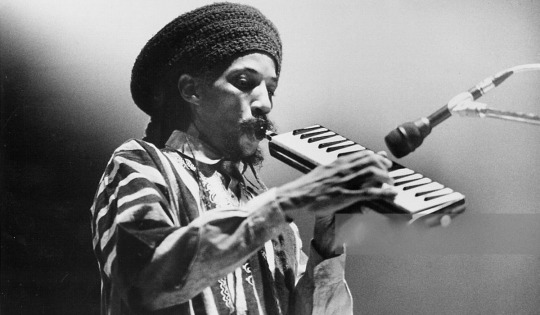
pictured: Augustus Pablo, one of the most important innovators of Dub. Without him, and without many of his contemporaries, I would reckon that half or more of all modern music would simply not exist.
CONTENT WARNING FOR THIS FINAL SECTION, THERE ARE LIKE LOTS OF STRANGE SLURS AND RACIST VIBES.
—
One last thing I wanna mention, this is slightly tangential but I think it's relevant to this conversation. It's always weird how lots of websites categorize things like this:
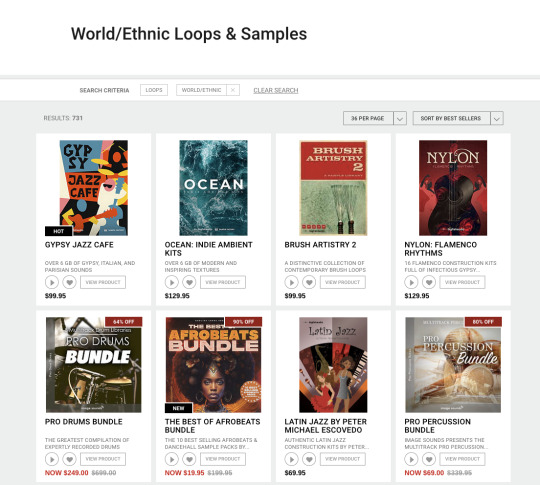
From Big Fish Audio... "G**sy*? "World/Ethnic Loops & Samples"? What the fuck are you talking about. Seems like racism to me.
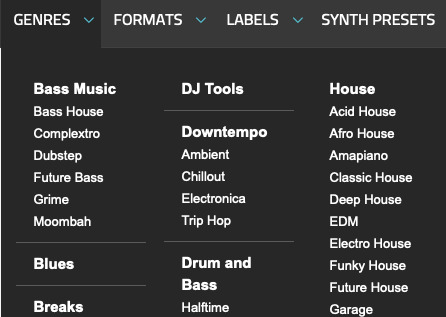

On Loopmasters they have a "World" section. Any Americanized genre gets its own category, but the entire continents of Africa and Asia as well as the country of India and region of the Middle East (which are part of Asia, hope this helps btw) and lastly South America are stuffed into the nebulous "World Label". Seems like racism to me. Are you telling me you weirdos can't figure out a better way to represent these things?

But then Psy Trance gets its whole entire own category? Aren't there only like five people who listen to Psy Trance? /hj . But like come on.
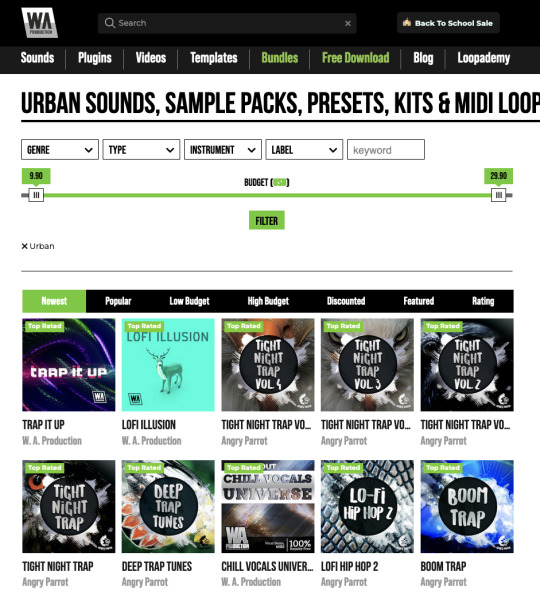
Shoutout to WA Productions for categorizing a universe of suspiciously mostly black music as """Urban"""". And this company is a dime a dozen, hundreds of corpos do this shit.
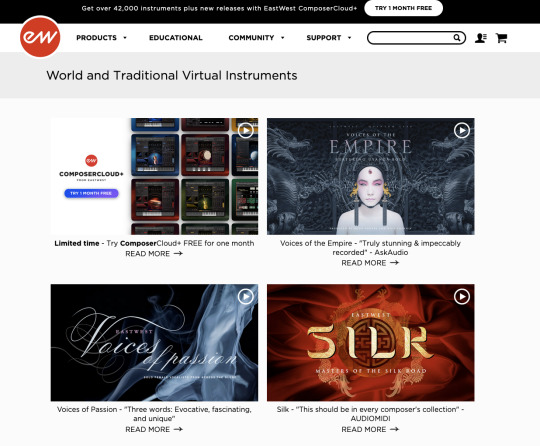
East fucking West, what is this dude. There is a racism happening, I just know it. Please give me a count of how many poc are on payroll at your company, I am so curious.
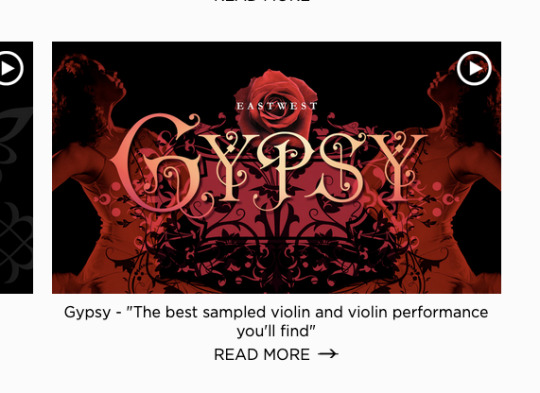
And while we're at it, East West, what is this. Tell me. Fucking tell me.
Thanks for reading.
251 notes
·
View notes
Text
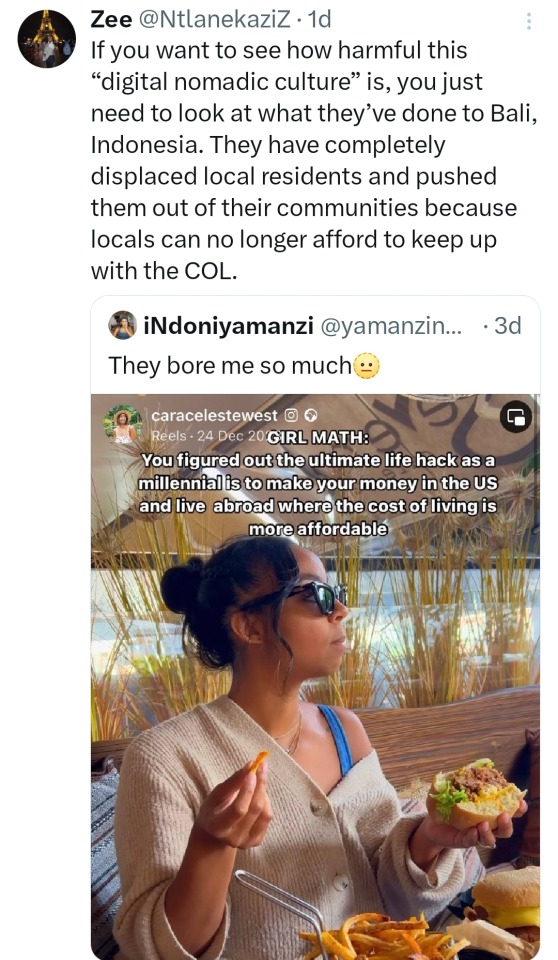
If you want to see how harmful this “digital nomadic culture” is, you just need to look at what they’ve done to Bali, Indonesia. They have completely displaced local residents and pushed them out of their communities because locals can no longer afford to keep up with the COL.
Original post: "They bore me so much🫥" with the caption from an Instagram story of. woman dining: "GIRL MATH: You've figured out the ultimate life hack as a millenial is to make you money in the US and live abroad where the cost of living is more affordable."
There's so many layers to unpack here. 'Tourism' in the Caribbean, for instance, is something I think about as well whenever I see people acting like this -these industries, which are highly exploitative towards the people and their communities and environments is one element -but the 'travelling to paradise' market itself is based in neo/colonialist frameworks and current mentalities and that itself is something that needs to be addressed much more. Especially with what is happening in Jamaica where so many Jamaicans are being pushed out of their own land when a tourist 'resort' wants to build or 'expand' because these 'ideal' locations are near the sea, where Jamaican people have been/are fishing for their own livelihoods and survival. I posted a video about this, but for those who haven't looked into these issues -I implore you to look into this.
I also think of Hawai'i, which has had many devastating impacts to their islands this past year -irreparable damages to both Native Hawaiians and the environment (and ongoing issues, such as the water being contaminated/and scarce there and yet tourists are prioritized for access to clean water sources) -and STILL people remained and traveled there during the Maui fires, and just overall despite countless pleas for them not to go they still do.
Among many the 'desirable destinations' marketed specifically to Europeans/Westerners as 'a getaway to' where they can detach from their busy lives, or to live permanently because it's 'too expensive' where they live -I sincerely wish they would come back down to earth and realize their imperialistic mentalities -especially when going to countries whose economies they perceived as 'poorer,' without looking critically at the country's infrastructure and history is just willful ignorance at best.
#feminist#feminism#tourism#tourist#gentrification#settler colonialism#colonialism#colonial violence#eco terrorism#hawaii#imperialism#western imperialism#travelling#travel#the caribbean#jamaica#dominican republic#bali#indonesia
107 notes
·
View notes
Text
Zahra explains perfectly the influence of the Rastafarian movement on Eastern Europe as a symbol of change and freedom after the fall of the USSR. The music and culture of Jamaica has touched this part of the world in a profound way!
Many Eastern Europeans grew up with ska and reggae music, picking up the culture that came with it, along with the style (colors, clothes, hair, jewelry, lifestyle) of the famous raggae musicians at the time. They know about the history of Jamaica and Reggae and the message behind it, which became important to their lives in a time of political change.
Rastafarianism mixed with the local culture, creating subcultures. Since music has a global reach, many Eastern Europeans created their own raggae bands and sung in their own language, sometimes mixing raggae with their local folk music. As Zahra explained, Jamaicans are excited and welcoming to people who have adopted this style around the world and who have their own ska and raggae subculture (like Polish reggae, since reggae there is mainstream).
The movement also touched the Balkans and it's been going on for decades now, although it's not very popular today. One person in the comments wrote "There's a Bob Marley statue in my small serbian village, that should tell you everything lol" 😂
I know in Greece there are still shops that sell clothes and jewelry of this style and some even braid or mat your hair. (Or sell hair extensions) There's still Greek raggae music played in beach bars sometimes. But in Cyprus raggae has grown roots because political change was also strong there during the last decades and people adopted the culture quickly.
Note: Some people dressing like this follow the Hippie subculture which has roots in Rastafarian subculture.
199 notes
·
View notes
Text
Non-paywall version here.
"When Arley Gill, head of Grenada’s National Reparations Committee, envisioned his work seeking repair for centuries of enslavement on the Caribbean island, one thing was certain: It was going to be a long slog.
But just two years since its founding, the task force is fielding calls from individuals around the world looking to make amends for ancestors who benefited from enslavement in Grenada.
“If you had told us this would be happening, we wouldn’t have believed you,” Mr. Gill says, crediting a burgeoning movement of descendants of enslavers getting wise to their family’s history and taking action.
In Grenada’s case, the momentum began with a public apology made by former BBC journalist Laura Trevelyan and her family in February at a ceremony on the island. They apologized for their forebears’ enslavement of people in Grenada and their enrichment from it, pledging an initial contribution of £100,000 ($130,000) toward education on the island.
“She opened the doors for people to feel comfortable” coming forward, says Mr. Gill.
In April [2023], Ms. Trevelyan and journalist Alex Renton co-founded an organization called Heirs of Slavery. Its eight British members have ancestors who benefited financially from slavery in various ways...
Heirs of Slavery says wealth and privilege trickle down through generations, and that there are possibly millions of Britons whose lives were touched by money generated from enslavement.
The group aims to amplify the voices of those already calling for reparations, like Caribbean governments. And it supports organizations working to tackle the modern-day consequences of slavery, both in the United Kingdom and abroad, from racism to health care inequities. But it’s also setting an example for others, drafting a road map of reparative justice for enslavement – at the individual level...
“Shining a light is always a good idea,” says Mr. Renton, who published a book in 2021 about his family’s ties to slavery, donating the proceeds to a handful of nongovernmental organizations in the Caribbean and England. “You don’t have to feel guilt about it; you can’t change the past,” he says, paraphrasing Sir Geoff Palmer, a Scottish Jamaican scholar. “But we should feel ashamed that up to this point we’ve done nothing about the consequences” of slavery.
Start anywhere
Most Africans trafficked to the Americas and Caribbean during the trans-Atlantic slave trade ended up in the West Indies. The wealth generated there through unpaid, brutal, forced labor funded much of Europe’s Industrial Revolution and bolstered churches, banks, and educational institutions. When slavery was abolished in British territories in 1833, the government took out a loan to compensate enslavers for their lost “property.” The government only finished paying off that debt in 2015.
The family of David Lascelles, the 8th Earl of Harewood, for example, received more than £26,000 from the British government after abolition in compensation for nearly 1,300 lives, while “the enslaved people were given nothing,” Mr. Lascelles says. He joined Heirs of Slavery upon its founding, eager to collaborate with peers doing work he’s been focused on for decades.
“People like us have, historically, kept quiet about what our ancestors did. We believe the time has come to face up to what happened, to acknowledge the ongoing repercussions of this human tragedy, and support the existing movements to discuss repair and reconciliation,” reads the group’s webpage.
For Ms. Trevelyan, that meant a very public apology – and resigning from journalism to dedicate herself to activism...
For Mr. Lascelles, a second cousin of King Charles, making repairs included in 2014 handing over digitized copies of slavery-related documents discovered in the basement of the Downton Abbey-esque Harewood House to the National Archives in Barbados, where much of his family’s wealth originated during enslavement.
“What can we do that is actually useful and wanted – not to solve our own conscience?” he says he asks himself...
“Listen and learn”
...The group is planning a conference this fall that will bring together families that benefited from the trans-Atlantic slave trade along with representatives from Caribbean governments and Black Europeans advocating for reparations. In the meantime, members are meeting with local advocacy groups to better understand what they want – and how Heirs of Slavery might assist.
At a recent meeting, “there was one man who said he wanted to hear what we had to say, but said he saw us as a distraction. And I understand that,” says Mr. Renton. “Maximum humility is necessary on our part. We are here to listen and learn, not try to take the lead and be the boss.”
Mr. Renton’s family has made donations to youth development and educational organizations, but he doesn’t see it as compensation. “I see this as work of repair. If I sold everything I own, I couldn’t begin to compensate for the lives my ancestors destroyed,” he says."
-via The Christian Science Monitor, August 1, 2023
Note: I know the source name probably inspires skepticism for a lot of people (fairly), but they're actually considered a very reliable and credible publication in both accuracy and lack of bias.
#slavery#reparations#antiblackness#racism#colonialism#united kingdom#uk#granada#caribbean#social justice#ancestry#black history#black lives matter#reparative justice#enslavement#abolition#systemic racism#good news#hope
242 notes
·
View notes
Text
Part 2: Why is the accent? Where and when does Hobie come from?
Part 1: Who, What (London Accents) | Part 3: How (Writing Tips)
In this section, we'll touch on racism since the 70s, black Londoner youth culture and how punk has historically interacted with those things.
To begin, let’s answer the question of what the hell all us black people are doing here in the U.K. 😂
Long story short, after World War II, the U.K. invited subjects of the empire over, in need of help rebuilding the place and doing essential work after getting bombed and stuff. There was further incentive on the subjects’ side to come as many of their men had been sent off for the war but were out of work and not properly compensated upon their return, leading to a poor economy and many people hoping for better in the ‘mother country’. Caribbean people, mostly Jamaicans, came over from then right through the 60s but were not welcomed and treated as British as many of them thought they might be… cause, you know, racism.
In 1962, 1968, 1971 and 1981, legislation was passed that made it incredibly difficult for black Caribbeans to come over, even to this day, which led to the migration of black people shifting to predominantly Africans, mostly West Africans, in the 80s, who would come for education and work purposes mostly. (For context, in the 2020s, there are more African people than Caribbean people in the U.K.). In the 70s and 90s, East Africans fleeing conflict have also immigrated en masse, although the numbers were quite a bit smaller than the West African and black Caribbean diaspora.
[not an expansive breakdown of all ethnicities, I just wanted to talk about the most populous black nationalities for the general gist of where black British life really got on a roll]
So, onto life as a black person in the U.K.
It’s important to remember that the U.K. was racist as fuck AND did not have Jim Crow laws or a history of relegating certain cities or neighbourhoods to ethnic minorities because, by the time we had been invited, there were not so many of us living in England for such laws to be deemed necessary (by racists).
Living literally side by side, often in the same building, with people who wanted to see them brutalized had a big impact on how black British people navigated life back then and has residual cultural effects on how we behave to this day.
One thing that stood out to me was the line where Hobie says he has “a laugh at the pub with the mandem”. As many of you will know, the pub is a large part of general British culture as the main drinking scene. Until more recently, you couldn’t just go and buy alcohol from the supermarket or whatever like you can now, so people had to go to the pub for a drink. Additionally, during times when getting clean water was unreliable due to cholera outbreaks, a drink from the pub was safer than drinking water.
It’s also important to know that, unlike clubs, many pubs sell food and are family-friendly, so while it’s not likely for a little kid to be bouncing to go the pub because it’s just basically like a restaurant to them, it’s a place that a child can be used to going to.
Not only do pubs sell food, but pubs also are places that are mostly used to watch football, as well as play pool, participate in pub quizzes (competitive general knowledge pop quizzes done in teams) and generally be out late to sit and talk.
That being said, as I mentioned before, how black people navigate where we live is different to how white people do.
Whilst many black people will go to the pub with their work colleagues or with their mixed friend groups, pubs generally have never been a haunt for black adolescents.
Instead, black drinking culture is more associated with dance and music, i.e. house parties, clubs (particularly clubs or club nights where music popular amongst the black community is played and, in older times, basement boozers) and lounges. Unlike white counterparts, most black kids will not have grown up going to the pub or around people who went and would not be used to going until they got invited out, likely by workmates.
To this day, although racism has chilled out so much since the mid-20th century, a lot of younger people actually still have a latent fear of facing racism from white football hooligan types and drunk, older white people in pubs. If you went to a pub, you typically wouldn’t see many young black people in there, if any.
The epitome of this mindset was on display during the last World Cup, during which Gen Z black U.K. TikTok was filled with half-jokes about the brutality they would face sitting in the pub to watch an England game if a black team member were to miss a kick or otherwise make a mistake. It was something we joked about in real life too and there was a rumour that went around - which many of us believed to be true - that two black guys had been thrown in the Thames because the black players had missed the penalty kicks they took.
It was just a rumour, however, people did take to racially abusing the players online and, whilst it wasn’t true, you can see what the general attitude towards pubs tends to be and why it’s not a hotspot for black youth.
There are U.K. pubs that historically have had more black patronage in black communities but there’s only a few and they’re not really a thing in London.
Knowing that, it’s not to say that no young black people frequent pubs, but it means that it says something about Hobie that he does (or his world, which we’ll talk about later). What it says exactly is up to your headcanon, but it’s worth noting that it’s not typical for a black teenager in London to hang out at the pub, even if they are rebellious and not concerned by the drinking age.
So you may be thinking, damn, why do pubs have such a reputation? What happened that meant that - to this day - there’s such a divide?
While the U.K. was always racist and was unwelcoming to those who arrived during the Windrush period, it continued to get worse going into the 70s. The increasing popularity of the fascistic political party called the ‘National Front’ saw the rise of ‘the immigrants are taking our jobs’ rhetoric used to appeal to the white working class that persists, to a less extreme, today, such as with the political party UKIP, as well as the English Defense League (EDL), both of which have taken on a more Islamophobic angle than the focused and explicit anti-black & anti-browness of the National Front. The National Front’s supporters would chant and sing stuff like “We’re gonna send the blacks back”.
In daily life, black kids had to deal with shameless racism, bullying and violence from their white peers. There was a ‘sus’ law implemented, which essentially made it so that police could (and very much did) stop and arrest any black person they saw on the street that they felt was ““““suspected person””””, which included unprovable and outrageously ridiculous bullshit like being suspected of ‘loitering with the intent to steal’ (so basically, if you’re black and outside, you were - and still are, especially if you’re young - likely to be suspected of this). As mentioned earlier, there were people who would watch games and get drunk in the pub, then go out into the streets on a destructive rampage would also take those opportunities of chaos to physically assault black and brown people.
All of this was on top of institutional racism and micro-aggressions like we have today but turned up to 10. Minorities didn’t feel safe going around their own city alone for fear of getting mobbed or having rocks thrown at them. Even in their own homes, racists were putting literal shit and bombs in their letterboxes. The popularity of the National Front saw a rise in Nazism - an especially wild expression of racism, considering the Nazis had bombed the fuck out of London in WW2, which was the reason the U.K. went crying to the subjects for help in the first place.
So, naturally, ethnic Londoners tended to craft and operate in their own spaces when it came to leisure, more attuned to the cultures from their family’s countries of origin as well as the kinds where they were just generally more accepted for who they are. Though no longer out of necessity for safety, this aspect of Black British culture persists today, to a lesser extent though, and latent anxieties about acts of extreme racism still remain in the collective subconscious, even though most young people today will have never experienced such extremes.
Just for clarity, this is not to say black people are afraid of white people in general, I’m not sure that could even have been said in the 70s, since there were also plenty of non-racist (aka normal) people too. Back then, the culture was probably a lot more gatekept than it has been for the past few decades, but I’m trying to explain why black British culture and black British life is a different experience to being white British, it’s not only experiencing racism, but it’s also that we just do different stuff cause we historically didn’t feel welcome at their figurative tables and thus did our own thing mostly. It’s why you still get friend groups that are predominantly black despite everyone’s families likely coming from different countries with different cultures, because we relate in terms of black British culture and not feeling especially understood amongst white counterparts. But if white people make us feel like they are down with us, we’re down with them, as one would hope lol.
Speaking of down white people, another huge part of Hobie’s character is that he’s a punk, of course.
So, not gonna lie to you guys, due to the things I just stated about how black people had to navigate the world and craft their own spaces in order to feel comfortable and safe, the punk scene (as we would think of it) has never been a thing that was popular amongst black British people. It’s a predominantly white scene and during the 70s was not unaffected by rising Nazism. To this day, there are still Nazi punks and what we call dirtbag leftists, so you can imagine, at the time, though there were and still are more non-racist white punks, there were enough Nazis that a. it’s not something that seemed welcoming to black people and b. non-racist White punks in the 70s felt that the Nazi problem was bad enough that they needed to do something big about it, which we’ll get onto.
Because we’re not a monolith, of course, there were black punks such as Poly Styrene, the lead singer of X-Ray Spex, and Basement 5, a punk-reggae band (remember this), but other than that, I haven’t been able to find documentation of black punk life in particular, nor have I been able to get any personal accounts from family. Punk is a small-ish scene to begin with, so you can imagine that the black people who participated are very few. Here, I’m not trying to say that few black people enjoyed listening to the music as part of their taste, I’m pretty sure a lot of young people would have liked the music but not necessarily been active in the scene/culture in the way that white counterparts were.
Again, the fact that Hobie is a full-out punk as a black teen says something about him or his world; what in particular, is totally up to interpretation and headcanon, but understand that it’s another unique behaviour.
A similar thing that did include black people was ‘skinhead’ culture, something that emerged from and celebrated the working class, especially Jamaican people, in the 1960s, but it was co-opted by ‘punk’ and white people, then drifted away from its associations with and relevance amongst black people and became most popular amongst Nazis in the 80s, associated with the ‘British Movement’. Most people will think of racist white football hooligan types when they think of skinheads nowadays, even though in reality, for both punks and skinheads, not all people in these subcultures are racist/fascist.
As I mentioned earlier, because minorities were living side by side with working-class white people, a lot of stuff that wasn’t kind of gatekeepy (i.e. super black) has always been at risk of being yanked from us and has historically been done by literal Nazis and I’m sure this plays a part in alternative scenes that stray very far from the cultures we’re raised in not being the most popular amongst us.
Nonetheless, non-racist punks and black people agreed on a lot of core points about classism/capitalism and the need to stomp out racism, which led to white punks starting the Rock Against Racism (RAR) organisation, which held concerts across the country with the intention of bringing people together to take a stand against racism. If you’re able to, I recommend watching the documentary about it called White Riot (2019), which whilst it does include some black interviewees, focuses on the white punks’ side of things and the racism of the time, as opposed to black life. Still worth the watch :)
Other than punk rock, you know what other acts were invited to play at these RAR concerts?
Black musicians who played funk and reggae were also invited. Even though their music taste was different, the message was the same. Additionally, it might surprise non-British people to hear but even white British people have long loved themselves some reggae, hence Bob Marley’s popularity here.
Reggae is a genre that is often used to speak on politics and social issues, it’s why Rastafarians love it and make such music. So, whilst the punk-reggae fusion of Basement 5 might sound strange today when reggae is not as popular as it once was, it makes total sense why. You can also see references to the London punk scene in the 70s (the time he was living in London) in Bob Marley’s song “Punky Reggae Party”.
I mention this to emphasise how the blackness of black British people, even in white space, has not typically proven to give way, that to be punk or believe in such values is not to relinquish all traces of black culture. I also say this to say, as I’ve said in a previous post bouncing off of Daniel Kaluuya’s thoughts on ‘punk’, that people who are adamant Hobie would not listen to genres of music that are popular with or created by predominantly black people alongside the more typical punk rock give off strange vibes. There’s no precedent for a black person to totally give up that part of them that they would’ve grown up with just because they’ve solidified a political view. Of course, some people are less into it than others, as I said earlier, black people are not a monolith, but given all this context, I’m begging people to not post things like ‘Hobie would never listen to [insert black genre here] because he’s a punk! Other people’s headcanons/playlists are stupid and they’re punk posers!’.
You can believe he only listens to genres of rock, and that’s fine, but stop telling black people that their headcanons where they project their more black tastes onto Hobie are inaccurate because they aren’t and it’s very strange to gatekeep interpretations of a black character from blackness in that way.
If you do want to know some genres popular amongst or pioneered by black British people, most of which popped off in the 90s, look to grime (hip hop, electronic), garage (electronic), drum n bass (electronic), jungle (electronic), U.K. drill (hip hop), afroswing (hip hop, r&b), reggae, dancehall (hip hop, reggae), hip hop, funk and r&b. I’d say pop since it’s popular amongst all ethnicities lol but, since Hobie is a punk, you’re gonna wanna exchange that for rock and indie, though I think it’s also fair to think there’s a few pop songs that Hobie would like, since being an anarcho-communist doesn’t mean you can’t have a little fun, idk. Headcanons and stuff are not really what I’m here to share or enforce. Plus, of course, a lot of these genres are anachronistic but, at the same time, I’m pretty sure most people’s playlists feature more modern songs anyway, hell, even the song selected as Hobie’s intro is from 2011.
And none of this is not to downplay Hobie’s love of rock genres either.
I did make a playlist for myself, if anyone wants it or recommendations you can drop an ask 🤓
In the past few years, there’s been a noticeable growth of alternative life in London black youth culture, notably the roller-skating scene, as well as more people participating in more classic takes on alternative culture like goths, punks, etc. and, of course, black nerd culture has been popping since the late 90s. The black people participating in these alternative cultures aren’t relinquishing their blackness, putting hip-hop in the bin and whatnot - people can be multi-faceted.
What I hope you take away from this is that Hobie is a unique and nuanced character, he’s not a typical representation of any of the things he is, which is personally why I love him so much. I also hope you understand that being a black punk in the U.K., before more recent times, would have been a different thing to being a white punk because, not only are you participating in a counter-culture, you’re going outside the safety net and norms of black British culture which has been positioned as inherently counter-cultural anyways and is one you can never hide your associations with or come out of. It says a lot about him, it comes down to headcanon what, but it’s important to recognise that these aspects of him are not a given but things that would have been purposeful developments or huge moments of self-discovery in his life.
Headcanons are something that throws somewhat of a spanner into the works. Everything I’ve said is historically accurate but we also don’t know that Earth-138’s New London would reflect all these aspects of our Earth’s London. Perhaps 138 is written in a race-blind kind of way or, not coming from black British culture, the writers may not envision the world authentically from our point of view and might be unaware of how it’s different; maybe the execs would not allow them to tap into the racist aspect of Nazism and have the writers keep it vague for marketability's sake; hell, maybe the date on the mugshot was just an Easter egg and not a canon-accurate date, who knows?
On top of that, if you headcanon Hobie as a transracial adoptee (meaning adopted by people of another race) or that he was orphaned at a very young age or otherwise not enculturated and socialised as a black boy, maybe none of this applies.
From the current slang to the casting of Daniel Kaluuya, it seems clear to me that, in tandem with the retro vibe, Hobie has been designed to also evoke more contemporary ideas of blackness so the full picture of what the writers have in mind is anyone’s guess at this point.
That being said, I feel like those conclusions would all take some stretching and reaching to come to. I’m not here to tell you what you can and cannot interpret or write, but I’m just trying to give some information so you can write more accurately and understand Hobie and Black Londoner life better.
So, now you understand where we’re coming from, I think you’re ready for the writing advice 😎
129 notes
·
View notes
Text
this was specifically requested BY Bree, so here we go🤷🏽♀️
“Hood Princess” bree
For starters, I wanna just get a little background info out the way before I do anything.
Bree is Bahamian, says she doesn’t experience racism, and its v likely that she has never lived outside of the Bahamas. The official language of the Bahamas is English and Haitian Creole, as many people of Haitian decent LIVE on the island. Haitian Creole derived from FRENCH, lets keep this in mind.
so first I wanna address Bree’s ignorance/marginalization of Caribbean people.
In the DC server I said “maldito mamaguevo” right after having a disagreement over…this message
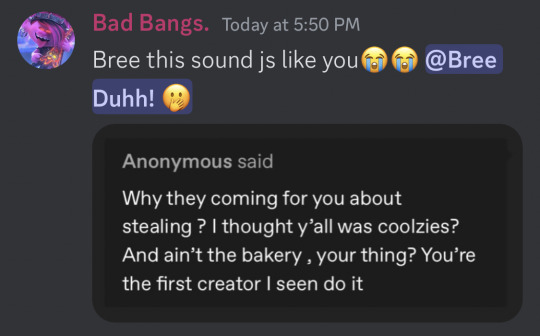
I thought it was obvious this was in a playful/joking manner, but maybe she took this as a personal attack/accusation. I would just like to say that if I suspected Bree abt this anon (which I didn’t because she had Honey BLOCKED for some reason during this), I wouldn’t have made a joke abt it. Not sent the SS to her. I would’ve made a mental note of it and kept it pushing.
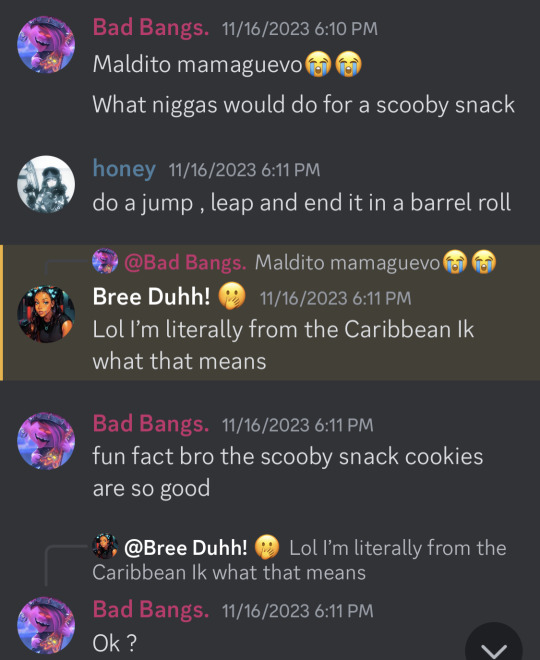
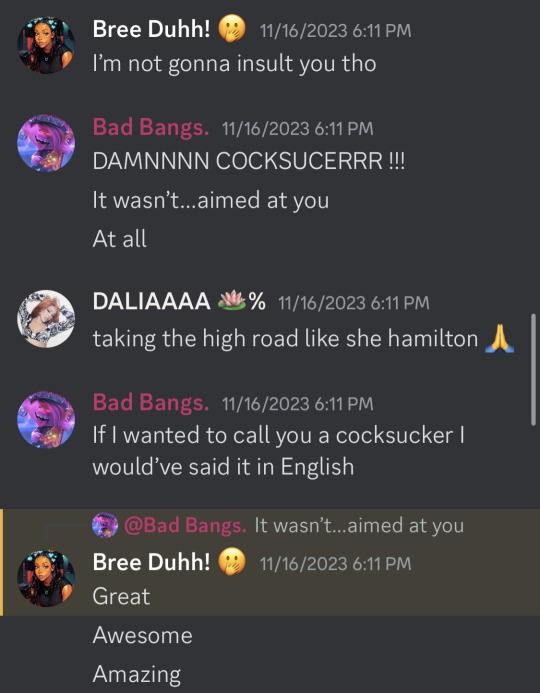
When Bree first sent this message I was confused, because as you know I have Dominican family. I speak Dominican Spanish, and generally only rlly know Dominican slang that I’ve learned from my brother and his side of the family. So obvi I was confused because Bree makes it known she’s very much Bahamian, so I googled what language the Bahamas speaks and if it’s anything like Dominican Spanish !
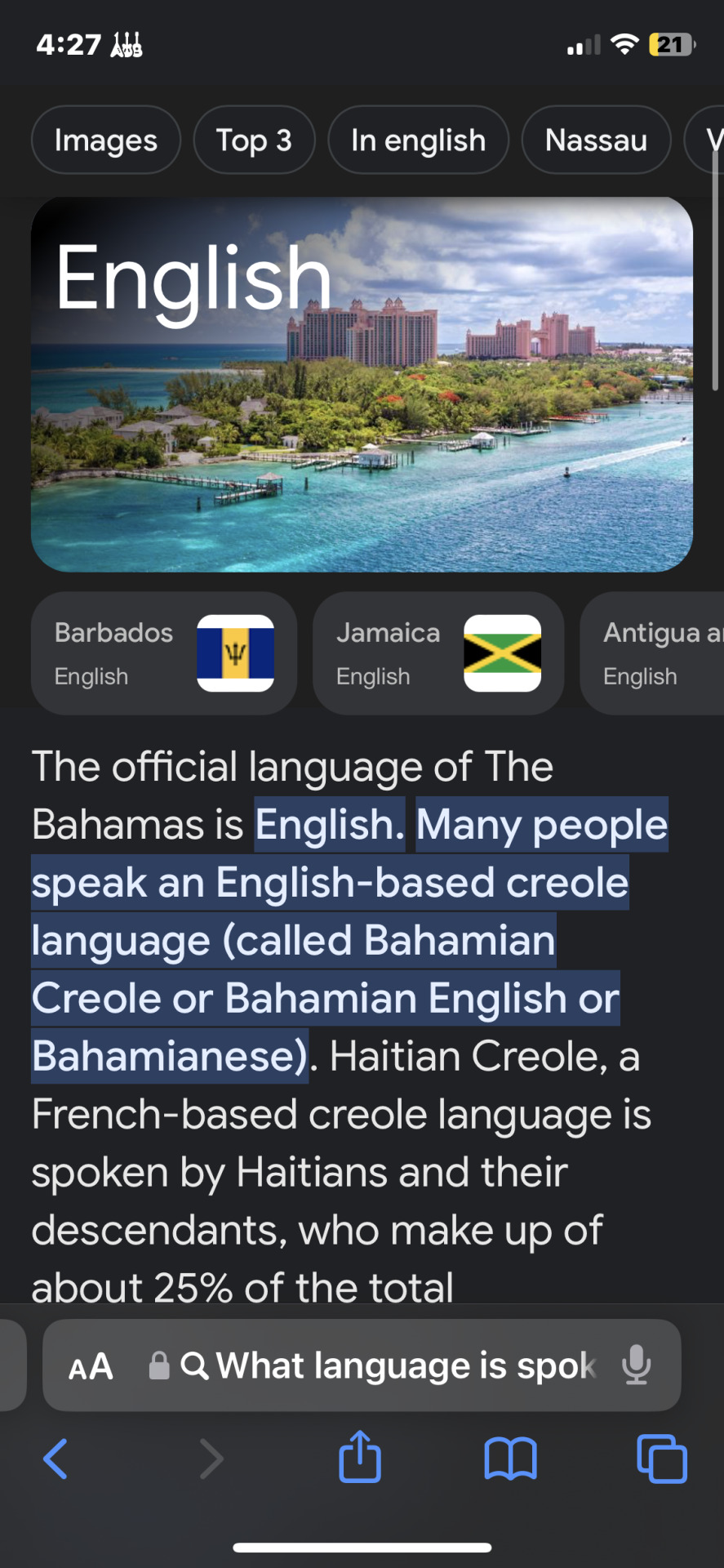
As you can see, they don’t speak Spanish…so what was the point of saying “I’m Caribbean I know what this means?” Anyone can be Caribbean…White black Asian Latino. If you’re born in the Caribbean you’re Caribbean…so why does this equate to her speaking spanish?
so naturally i went to Dalia abt it cuz even tho I myself could feel this was iffy, I wanted to ask someone else who is more submerged in Dominican culture. And Dalia said this felt iffy, because she has marginalized the Caribbean before and hopped between different dialects that are…not her own! Like Jamaican patois
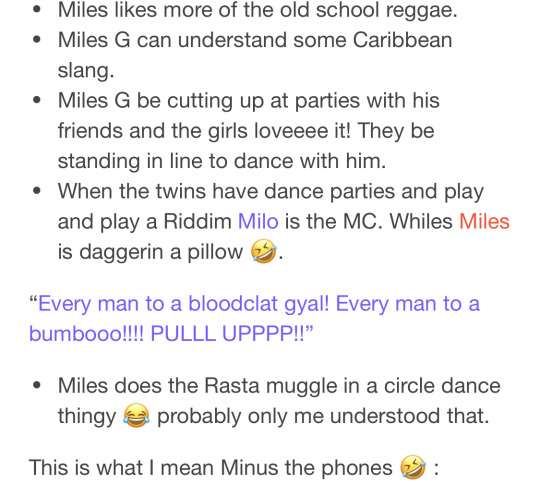
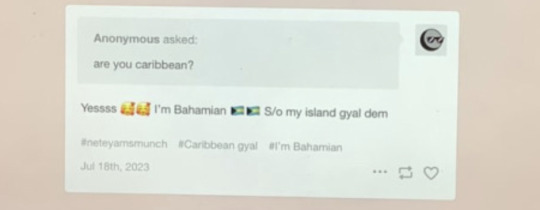
But besides that, lets address another issue w Bree before we dive into her history of supporting a miles smut writer.
As some of you may know, Bree used to refer to herself as a “hood princess” and used PLENTYYYYY of AAVE and african american culture in her works…lets break this down rq
Bree has earned herself a reputation as a rather aggressive and obnoxious blogger, doing absolutely nothing but fighting w gwiles Stans and “speaking her mind” abt things nobody really paid any attention to. She said she was a pale “natural blonde” girl (I haven’t seen shawty so idk wtf she looks like)

So why does she run around claiming the title of a “hood princess” when she 1, did not grow up in an American hood, and 2, is probably white passing from her own mouth?
for black children who grew up in the hood, you know it’s nothing to brag about. It’s a low income neighborhood, a “bootleg” version of a neighborHOOD. Hence the name. It’s an incomplete neighborhood.
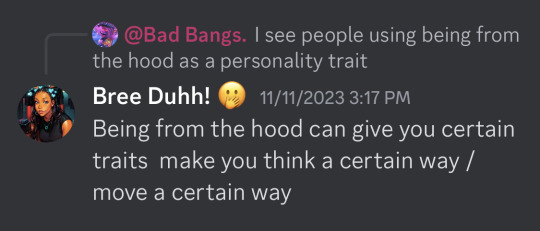
When I had a general discussion w her about the fetishization of African American culture a week ago, she seemed mad avid to defend making the hood be your whole personality..trying to justify it by saying it “makes you think and act a certain way” which is v true! However I’ve never once tried to make myself into a sexxyred “hood princess” js cuz I grew up in a low income area. She even agreed that african american culture was fetishized, so I’m so confused as to why she was offended by my post yesterday?
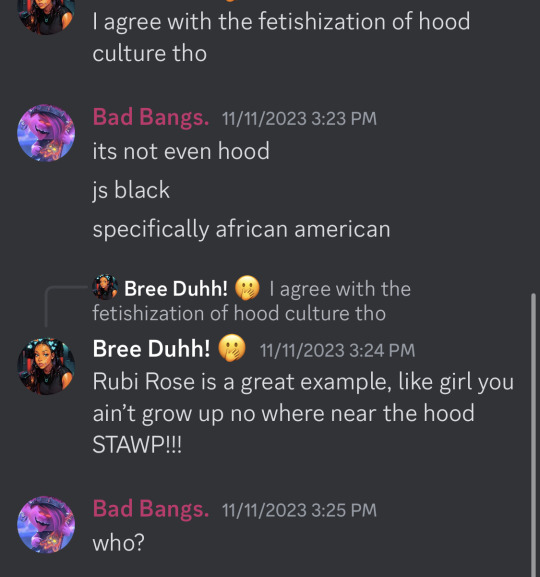
So as to why she’s mad…idk. When I’ve talked to her abt this issue before, and I’ve literally just taken the issue online this time as a black creator
now let’s move on to Bree’s ableism☠️

I got her so mad she tried to tell me I was “half a chromosome away from a learning disability”…ok!!
But besides that, lets talk about her defending Anika!
So this summer, a popular creator by the name Anikaluv made a fic where miles had readers…nudes in his phone😭
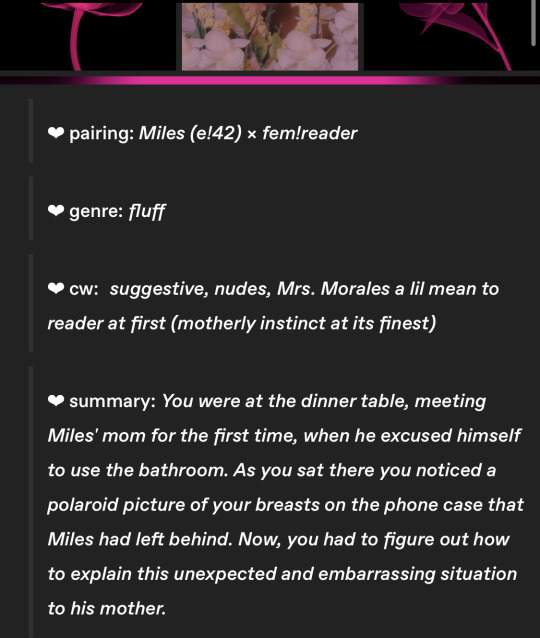
Children should not be sending, keeping, or taking nudes of themselves or anyone else. Wether that’s 14, 15, 16, 17. Just DON’T! It’s illegal, and this fic glosses over the fact that it’s a disgusting crime. Not only that, but miles mother SEES the readers nudes…so😭
Bree immediately took to defend Anika, showing her support for her and saying if we keep complaining we won’t have anything to read☠️☠️

When this is Anika…and Bree DEFENDING Anika
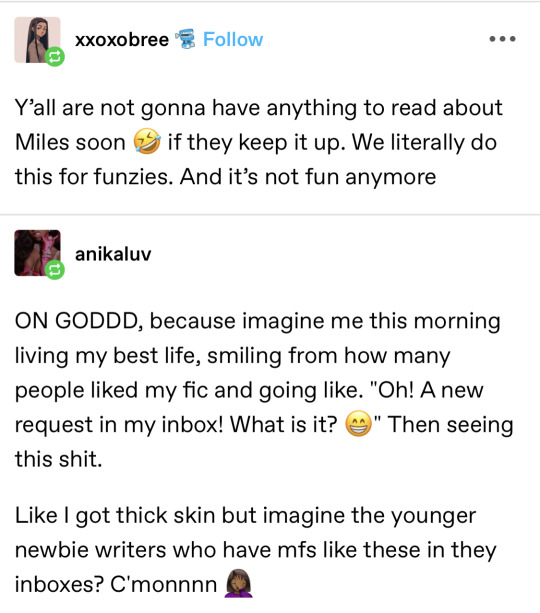
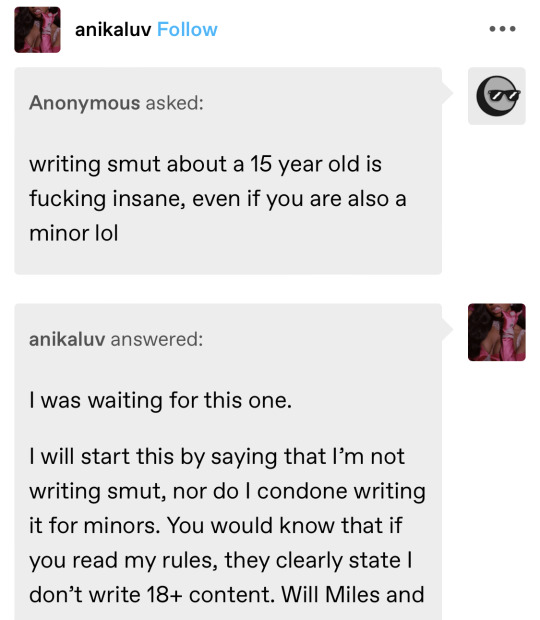
Anika also wrote about the reader buying miles a thong?? At 15?? You don’t “read miles smut” but you sure read anikas work !
FYI…Anika was going to write about Reader and miles GRINDING in said lingerie. And Anika said she despises miles smut, and so did you! But at the end of the day that doesn’t change what you said
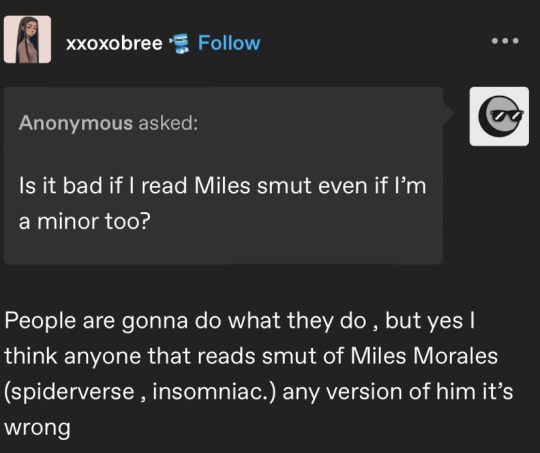
Here’s the screenshot you wanted ms. “People are gonna do what they do”
mouthful, but there we go
56 notes
·
View notes
Text
The SAWP is a temporary labour program that brings foreign workers to Canada for periods between six weeks and eight months annually [...], paving the way for the recruitment of Jamaican workers as well as workers from other Caribbean countries like Trinidad and Tobago and Barbados [beginning] in 1968. [...] The SAWP has been a resounding success for Canadian growers because offshore indentured workers enable agribusiness to expand and secure large profits. Being indentured means that migrant farm workers are bound to specific employers by contractual agreements [...]. First, they are legally prevented from unionizing. [...] Additionally, because they are bound to specific employers, they must ensure that the employer is happy with them [...]. For instance, migrant farm workers are forced to agree to growers’ requests for long working hours, labour through the weekend, suppress complaints and avoid conflicts, if they want to stay out of “trouble” [...]. In “Canada’s Creeping Economic Apartheid”, Grace Galabuzi shows that the Canadian Government’s immigration policy is, in reality, a labour market immigration policy [...].
[Text by: Julie Ann McCausland. "Racial Capitalism, Slavery, Labour Regimes and Exploitation in the Canadian Seasonal Agricultural Workers Program". Caribbean Quilt Volume 5. 2020. Paragraph contractions added by me.]
---
A big finding that came out of the oral history interviews was a much richer tapestry of worker protest than has previously been documented. Speaking with workers – including former workers back in their home countries of Jamaica and Barbados – allowed me to hear the types of stories that often don’t make it into archives or newspapers. Interviewees told me stories about wildcat strikes, about negotiating conditions with employers, and also about protesting their home governments’ role in organizing the migrant labour program. [...] [T]hings did not have to be this way; our current world was anything but inevitable. [...] [But] economic forces transformed tobacco farming (and agriculture writ large), [...] leaving mega-operations in their wake. [...] [L]arge operations could afford [...] bringing in foreign guestworkers. The attraction of foreign workers was not due to labour shortages, but instead in their much higher degree of exploitability, given the strict nature of their contracts and the economic compulsion under which they pursued overseas migrant labour. [...] Ontario’s tobacco belt (located in between Hamilton and London, on the north shore of Lake Erie), was from the 1920s to 1980s one the most profitable sectors in Canadian agriculture and the epicentre of migrant labour in the country [...]. In most years, upwards of 25,000 workers were needed to bring in the crop. [...]
[The words of Edward Dunsworth. Text is a transcript of Dunsworth's responses in an interview conducted and transcribed by Andria Caputo. 'Faculty Publication Spotlight: Ed Dunsworth's "Harvesting Labour"'. Published online at McGill Faculty of Arts. 15 December 2022. At: mcgill.ca/arts/article/faculty-publication-spotlight-ed-dunsworths-harvesting-labour. Some paragraph breaks/contractions added by me.]
---
Jamaican agricultural workers say they face conditions akin to “systematic slavery” on Canadian farms, as they call on Jamaica to address systemic problems in a decades-old, migrant labour programme in Canada. In a letter sent to Jamaica’s minister of labour and social security earlier this month [August 2022], workers [...] said they have been “treated like mules” on two farms in Ontario, Canada’s most populous province. [...] The workers [...] are employed under [...] (SAWP), which allows Canadian employers to hire temporary migrant workers from Mexico and 11 countries in the Caribbean [...]. “We work for eight months on minimum wage and can’t survive for the four months back home. The SAWP is exploitation at a seismic level. Employers treat us like we don’t have any feelings, like we’re not human beings. We are robots to them. They don’t care about us.” Between 50,000 and 60,000 foreign agricultural labourers come to Canada each year on temporary permits [...]. Canada exported more than $63.3bn ($82.2bn Canadian) in agriculture and food products in 2021 – making it the fifth-largest exporter of agri-food in the world. [...]
[Text by: Jillian Kestler-D'Amours. "Jamaican farmworkers decry ‘seismic-level exploitation’ in Canada". Al Jazeera (English). 24 August 2022.]
---
In my home country, St. Lucia, we believe in a fair day’s pay [...]. In Canada, we give more than a fair day’s work, but we do not get a fair day’s pay. [...] I worked in a greenhouse in [...] Ontario, growing and harvesting tomatoes and organic sweet peppers for eight months of the year, from 2012 to 2015. [...] In the bunkhouse where I lived, there were typically eight workers per room. Newly constructed bunkhouses typically have up to fourteen people per room. [...] I also received calls from workers (especially Jamaicans) who were either forbidden – or strongly discouraged – from leaving the farm property. This outrageous overreach of employer control meant that workers had difficulty sending money home, or buying necessary items [...]. [O]n a lot of farms, [...] workers’ movement and activity is policed by their employers. The government knows about this yet fails to act.
[Text are the words of Gabriel Allahdua. Text from a transcript of an interview conducted by Edward Dunworth. '“Canada’s Dirty Secret”: An Interview with Gabriel Allahdua about migrant farm workers’ pandemic experience'. Published by Syndemic Magazine, Issue 2: Labour in a Treacherous Time. 8 March 2022. Some paragraph contractions added by me.]
---
The CSAWP is structured in such a way as to exclude racialized working class others from citizen-track entry into the country while demarcating them to a non-immigrant status as temporary, foreign and unfree labourers. The CSAWP is [...] a relic of Canada’s racist and colonial past, one that continues unimpeded in the present age [...]. [T]he Canadian state has offered a concession to the agricultural economic sector in the way of an ambiguous legal entity through which foreign agricultural workers are legally disenfranchised and legally denied citizenship rights.
[Text by: Adam Perry. "Barely legal: Racism and migrant farm labour in the context of Canadian multiculturalism". Citizenship Studies, 16:2, 189-201. 2012.]
---
Other publications:
Smith. 'Troubling “project Canada”: the Caribbean and the making of “unfree migrant labour”’. Canadian Journal of Latin American Studies Volume 40, number 2. 2015.
Choudry and Thomas. "Labour struggles for workplace justice: migrant and immigrant worker organizing in Canada". Journal of Industrial Relations Volume 55, number 2. 2013.
Harsha Walia. "Transient servitude: migrant labour in Canada and the apartheid of citizenship". Race & Class 52, number 1. 2010.
Beckford. "The experiences of Caribbean migrant farmworkers in Ontario, Canada". Social and Economic Studies Volume 65, number 1. 2016.
Edward Dunsworth. Harvesting Labour: Tobacco and the Global Making of Canada’s Agricultural Workforce (2022).
Edward Dunsworth. “‘Me a free man’: resistance and racialisation in the Canada-Caribbean Seasonal Agricultural Workers Program,” Oral History Volume 49, number 1. Spring 2021.
81 notes
·
View notes
Text
'Writer and poet Benjamin Zephaniah has died aged 65, after being diagnosed with a brain tumour eight weeks ago.
A statement posted on his Instagram account confirmed he died in the early hours of Thursday.
The statement said Zephaniah's wife "was with him throughout and was by his side when he passed".
"We shared him with the world and we know many will be shocked and saddened by this news," it added.
Zephaniah was born and raised in Handsworth, Birmingham, the son of a Barbadian postman and a Jamaican nurse. He was dyslexic and left school aged 13, unable to read or write.
He moved to London aged 22 and published his first book, Pen Rhythm.
His early work used dub poetry, a Jamaican style of work that has evolved into the music genre of the same name, and he would also perform with the group The Benjamin Zephaniah Band.
As Zephaniah's profile grew, he became a familiar face on television and was credited with bringing Dub Poetry into British living rooms.
He also wrote five novels as well as poetry for children, and his first book for younger readers, Talking Turkeys, was a huge success upon its publication in 1994.
On top of his writing work, Zephaniah was an actor and appeared in the BBC drama series Peaky Blinders between 2013 and 2022.
He played Jeremiah "Jimmy" Jesus, appearing in 14 episodes across the six series.
Zephaniah famously rejected an OBE in 2003 due to the association of such an honour with the British Empire and its history of slavery.
"I've been fighting against empire all my life, fighting against slavery and colonialism all my life," he told The Big Narstie Show in 2020.
"I've been writing to connect with people, not to impress governments and monarchy. So I could I then accept an honour that puts the word Empire on to my name? That would be hypocritical.
He often spoke out about issues such as racial abuse and education.
When he was younger, Zephaniah served a prison sentence for burglary and received a criminal record.
In 1982, Zephaniah released an album called Rasta, which featured the Wailers' first recording since the death of Bob Marley.
It also included a tribute to the then-political prisoner Nelson Mandela, who would later become South African president.
In an interview in 2005, Zephaniah said growing up in a violent household led to him assuming that was the norm.
He recalled: "I once asked a friend of mine, 'What do you do when your dad beats your mum?' And he went: 'He doesn't.'
"I said, 'Ah, you come from one of those, like, feminist houses. So, what do you do when your mum beats your dad?'"
In 2012, he was chosen to guest edit an edition of BBC Radio 4's Today programme.
Zephaniah was nominated for autobiography of the year at the National Book Awards for his work, The Life And Rhymes Of Benjamin Zephaniah, which was also shortlisted for the Costa Book Award in 2018.
During a Covid-19 lockdown, Zephaniah recited one of his poems in a video for the Hay Festival.
"Benjamin was a true pioneer and innovator. He gave the world so much," the statement announcing his death said.
"Through an amazing career including a huge body of poems, literature, music, television and radio, Benjamin leaves us with a joyful and fantastic legacy."
A statement from the Black Writers' guild, which Zephaniah helped establish, said: "Our family of writers is in mourning at the loss of a deeply valued friend and a titan of British literature. Benjamin was a man of integrity and an example of how to live your values."
Others paying tribute included author Michael Rosen, who said: "I'm devastated. I admired him, respected him, learnt from him, loved him. Love and condolences to the family and to all who loved him too."
Actress Adjoa Andoh posted: "We have lost a Titan today. Benjamin Zephaniah. Beautiful Poet, Professor, Advocate for love and humanity in all things. Heartbroken. Rest In Your Power - our brother."
Peaky Blinders actor Cillian Murphy said in a statement: "Benjamin was a truly gifted and beautiful human being.
"A generational poet, writer, musician and activist. A proud Brummie and a Peaky Blinder. I'm so saddened by this news."
Broadcaster Trevor Nelson said: "So sad to hear about the passing of Benjamin Zephaniah. Too young, too soon, he had a lot more to give. He was a unique talent."
Singer-songwriter and musician Billy Bragg added: "Very sorry to hear this news. Benjamin Zephaniah was our radical poet laureate. Rest in power, my friend."
Comedian, actor and writer Lenny Henry said: "I was saddened to learn of the passing of my friend Benjamin Zephaniah. His passion for poetry, his advocacy for education for all was tireless."
Writer Nels Abbey said: "To call this crushing news is a massive understatement. He was far too young, far too brilliant and still had so much to offer. A loss we'll never recover from."
The X/Twitter account for Premier League football club Aston Villa, whom Zephaniah supported said everyone at the club was "deeply saddened" by the news.
"Named as one of Britain's top 50 post-war writers in 2008, Benjamin was a lifelong Aston Villa fan and had served as an ambassador for the AVFCFoundation. Our thoughts are with his family and friends at this time."'


#Benjamin Zephaniah#The Benjamin Zephaniah Band#Peaky Blinders#Cillian Murphy#Adjoa Andoh#Michael Rosen#Black Writers Guild#Hay Festival#The Life And Rhymes Of Benjamin Zephaniah#Jeremiah “Jimmy” Jesus#Rasta#Pen Rhythm#Aston Villa#Nels Abbey#Lenny Henry#Billy Bragg#Trevor Nelson
29 notes
·
View notes
Text
drag race: boys edition
we had gender bent edits, we had paralell universes, and i'm not sure if someone has done this, but in case it hasn't, here it is. did i need to do this? yes, yes i did. enjoy!
[listen, i saw a video from runner eye and if i can't stop thinking about it, you have to be the ones to be punished by it, i don't make the rules.]
roberta mckenzie. a comedy queen from glasgow. she loves the audience, mostly working up the patreons in hopes to find a gold mine of weird info dump, enough to make the rest of the bar laugh. is the makeup rough? yes, very much so. is the material roast winning? not exactly... but she's new to the game and is trying her best. plus, her outfits pay homage to jamaican patterns every chance she has and most of us enchanted by the charisma and bad puns.
rhonda. one-name-only for a one-personality-only and that is... snake! she's the one pretending to be zen and "i don't do drama" but has the most snake rattle sound effects during her confessionals. she also tries to steal henrietta hotts from luna kohko, and the audience saw it from A MILE AWAY. unsuccessfully of course... HAVE YOU SEEN LUNA? she's the trade of the season.
kassandra. she dj's on the weekends all mounted in silver gowns and small boobie bibs (as she calls them despite being annoyed other people refer to them as that). kassandra has issues with everyone that ISN'T doing recreational drugs at her gigs and call them "stiffs" for it. however, despite looking and sounding harsh... well, that's about it. there's a reason she and luna get along so well!
glitter renell. "a traditional drag queen" according to herself, and to new queens it only means "my uncle in a wig with a rough and patchy makeup work and plastic-ey wigs". the only queen not wearing "fantasy" by britney but who's noticing?? her special number involves ripping off the sleeves of her outfits and revealing MASSIVE biceps, but often times they pop off on their own. got the magic mike title of the season.
ingrid. she's a "sporty type of queen", has multiple tricks with golf clubs, and despite having a couple of head hitting tricks in her history, she tries her best. it sometimes can serve her as a pole to drop to the ground in a split and honestly? work. ingrid is considered one of the hottest and cutest since her shyness brings a different glow to her eyes, which are LOST in pink glitter and magical rainbow shaped makeup. she dares and we love it, leave her alone.
luna kohko. this is a SEASONED queen, alright? makeup on point, fashion in place, attitude to donate, and walking the runway like she built that shit. however, when it comes to friendships in the werk room... don't speak, don't come near, don't come around... in fact, don't come at all. luna doesn't waste time with phony queens and prefers things exactly the opposite of her: straight. she's a lesbian, which means she loves dating drag queens, and since entering the show she has a LIVE AND THRIVE romance with the innocent henrietta hotts. "if that crusty fucking hippie so much as breathes the same air as henrietta again, we're gonna have a fucking problem, yeah? i've seen her lurking the machines trying to strike up a conversation about climbing. there's only one building henrietta is gonna climb and it's not a limp one."
noelle waves. "we have a wall of fabric in that werk room and you continue to come out in swim suits. STOP - RELYING - ON - THAT - BODY". she's a bit reserved most of the time, but if the "girls are fighting", she's the first to step up and play MOTHER. the public likes her, but she's not exactly winning challenges. "safe" defines noelle better than "creative" or "winner", but she tries and helps everyone during challenges.
henrietta hotts. THIS GIRL HAS IT, OK? her signature look is the red lipstick and the blonde wig, and with those beautiful freckles, her persona is very much the girl next door. it makes the judges go "i feel like i haven't met henrietta yet, and i know there's someone in there that needs to... ROAR. also, baby... you need more makeup." is she the smartest? no. is she the most problem-solving? no. is she the most graceful? YOU BET HER ASS COVERED IN GLITTER SHE FUCKING IS.
graham cracker. ANOTHER UNCLE IN A WIG. barely knows how to walk in heels and is giving kim chi vibes. however, because of her leadership skills (which are not comparable to noelle's) she does manage to maintain her position for a while since most of the girls are lowkey scared of her. she's unpredictable and most of the contestants suspect she's straight.
carlota miranda. THIS IS THE MOST EXTROVERTED QUEEN ON THE RUNWAY, however, the boom mic needs to enter her throat to pick up what she's saying due to her bashfulness. not a fighter type but if someone comes for her???? she'll definitely... apologize for it. "fuck, don't fight" is her motto, followed by a timid little giggle since she tries not to curse. her style is "executive realness" but covered in crystals and diamonds. "it's either a mugler or nothing, babes. i don't have time to look like cel. sanders..."
felicia butterfly. annoying as alyssa edwards and untalented as... well, [REDACTED WINNER OF SEASON 4]. she's a one trick poney and the trick is... well, the public and the production are still trying to find it but in the mean time she becomes the bud of the joke. it's kind of entertaining watching her trying to understand anything in the werk room. it gets old but... she leaves pretty soon, so no problem there.
doge style. always wearing dogs' styles on her wigs, it's her signature. the poodle poof is AMAZING. she also becomes friends with everybody, particularly with the nervous ones, like carlota and henrietta since doge's hugs are infallible to relax the girls in situations of stress. she sometimes lets a facial hair look take over if the look calls for it, while the others are afraid of embracing it. "i'm not a woman impersonator, i'm just creative, get over it!" she has a HUGE CRUSH ON ELLA FAME, and it's reciprocated. rumour has it they fucked on the first week and are already planning a getaway.
ella fame. the most exquisite wigs in the werk room NO QUESTIONS ASKED. has beef with gigi goode for the title of best hair styles, but since her house is older and richer, she thinks she has a better chance to win this one pool on twitter. overall, ella has a walk to kill for, one that graham cracker has been trying to learn since day one. "i got it from naomi... you either know it... or you dont." she tells and retells the time she walked the same runway as naomi, even though everyone keeps reminding her that it happened as elijah, not as ella, but as she says in the confessional: "these bitches are so fucking jealous they're causing me intern wrinkles.".
jacoba zabinski. she's not very creative, doesn't have an interesting name, doesn't know how to walk differently than a constipated bear and doesn't know how to wear a wig. to be fair, she's only in the show to get clout for her male persona, jakub. bodybuilding is not paying off since his scandals in multiple gyms for his part time job as an instructor. so instagram shit tea and self taner brands have been the bread winning besides being the biggest bitch in the room. she enters the porkchop hall of fame. OBVIOUSLY.
#litg#love island the game#litg s2#litg season 2#litg arjun#litg bobby#litg carl#litg elijah#litg felix#litg gary#litg graham#litg henrik#litg ibrahim#litg jakub#litg kassam#litg lucas#litg noah#litg rocco#this has been on my mind for exactly an hour
34 notes
·
View notes